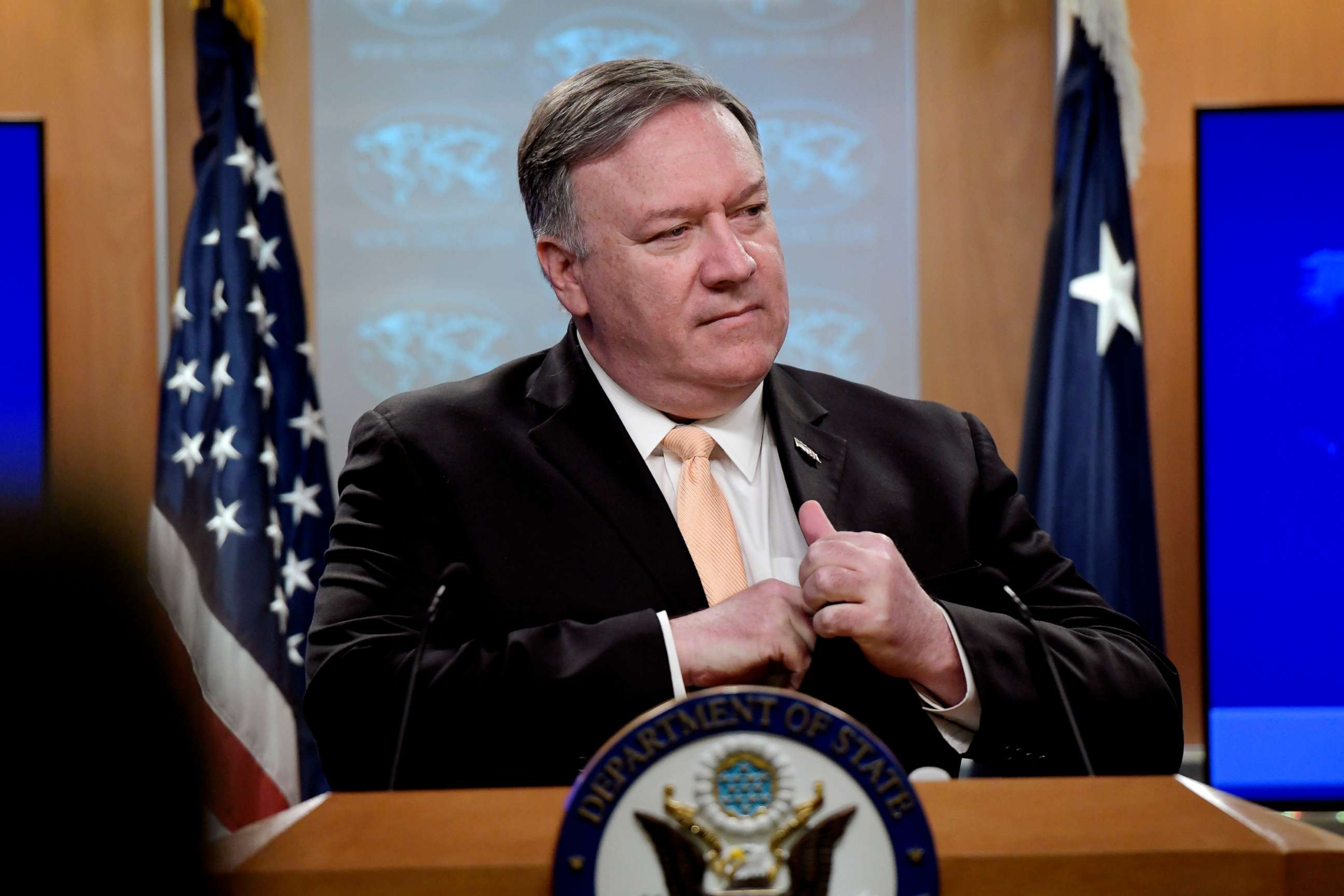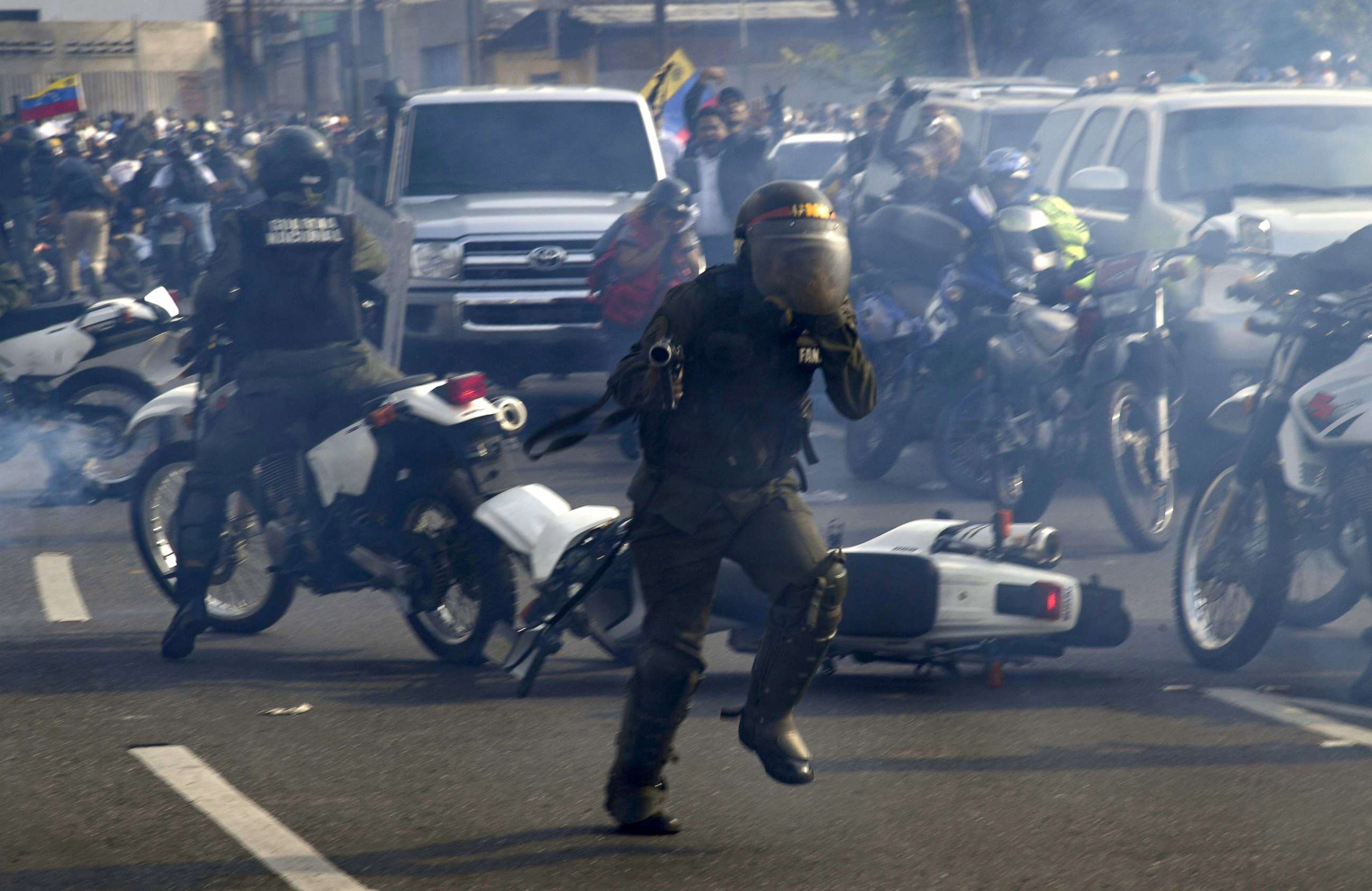Venezuela's Nicolas Maduro is 'ruling for the moment, but he can't govern': Secretary of State Mike Pompeo
Pompeo said the Venezuelan people will demand Maduro leaves.
Amid political unrest in Venezuela, Secretary of State Mike Pompeo said Sunday that President Nicolas Maduro is "ruling for the moment," but cannot be part of the country's future, reiterating the Trump administration's support for interim President Juan Guaidó.
"We’ve supported the National Assembly’s choice. Juan Guaidó is the interim president of the country, and as you know, these things sometimes have bumpy roads." Pompeo told ABC News Chief White House Correspondent Jonathan Karl on "This Week" Sunday.
"(Maduro's) ruling for the moment, but he can't govern. There's enormous poverty, enormous starvation, sick children that can't get medicine," Pompeo added. "This is not someone who can be part of Venezuela's future and whether that change takes place today or tomorrow or a week from now, one can't predict."
Pompeo also said on Sunday, "Maduro cannot feel good about the security of his position today, and he shouldn't. Because the Venezuelan people will demand, ultimately, that he leave."
The opposition-controlled National Assembly declared Guaidó interim president in January, but months of demonstrations and U.S. sanctions have not forced Maduro from his grip on power -- even after a major uprising Tuesday. According to The Washington Post, in an interview on Saturday, Guaidó acknowledged that the opposition had not drawn enough support from the military and members of Maduro’s inner circle to force him to step down.
"Maybe because we still need more soldiers, and maybe we need more officials of the regime to be willing to support it, to back the constitution," Guaidó told the Post.

Earlier this week, Pompeo charged that Russia had blocked U.S. efforts to get Maduro out of the country, persuading him at the last minute not to take a waiting plane to Cuba. Karl asked Pompeo if Maduro would still be in power if he did not have the support of the Cuban and Russian governments.
"Without the Cubans, there would be no possibility he would still be in power. They are -- they are at the center of this," the secretary said, noting Cuban security forces are guarding Maduro.
Karl pressed, "You said the Cubans. How about the Russians?"
"Oh, the Russians -- the Russians need to get out, too," Pompeo said. "We want every country -- Iran is in there today. They need to leave as well. Every country that is interfering with the Venezuelan people's right to restore their own democracy needs to leave."
Sitting alongside activist Fabiana Rosales, Guaidó's wife, in the Oval Office at the end of March, President Donald Trump told reporters that "Russia has to get out" of Venezuela. However, on Friday, after an hour-long call with Russian President Vladimir Putin, Trump told reporters that Putin wasn't "looking to get at all involved in Venezuela."
"We talked about many things. Venezuela was one of the topics. And he is not looking at all to get involved in Venezuela other than he'd like to see something positive happen for Venezuela. And I feel the same way," the president said.
"Aren’t they already deeply involved in supporting Maduro?" Karl asked Pompeo on "This Week."
"The president has said that the Russians must get out. ... The objective is very clear; we want the Iranians out, we want the Russians out, we want the Cubans out. That’s ultimately what has to take place in order for Venezuelan democracy to be restored," the secretary said. "I don’t think anything the president said is inconsistent with that."

America's top diplomat said that the administration has "a full range of options" prepared to respond to the situation in Venezuela, including some that involve the U.S. military. Pompeo was at the Pentagon on Friday discussing these options.
He told Karl that he was there "making sure that when this progresses, and a different situation arises, that the president has a full-scale set of options; diplomatic options, political options, options with our allies, and then ultimately, a set of options that would involve use of U.S. military. We’re preparing those for him so that when the situation arises, we’re not flatfooted."
He did not elaborate on what kind of situation would lead to the U.S. military taking action.
In a press release Saturday, Republican Sen. Todd Young of Indiana, called on the chairman and ranking member of the Senate Foreign Relations Committee to hold a hearing with administration officials about this possibility.
"The brutal Maduro Regime has caused unspeakable suffering amongst the citizens in Venezuela and I commend the brave Venezuelans who are standing up for their freedom and for their basic human rights. However, I am concerned by reports of possible U.S. military intervention in Venezuela," the press release read.
"Does the president believe that he can intervene militarily without getting congressional authorization?" Karl asked Pompeo on "This Week."
"The president has his full range of Article II authorities and I’m very confident that any action we took in Venezuela would be lawful," he said.




